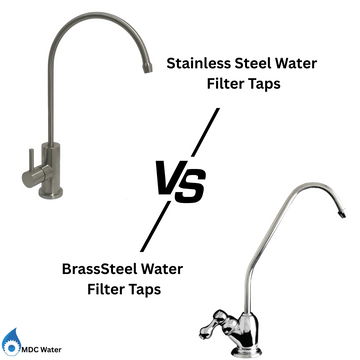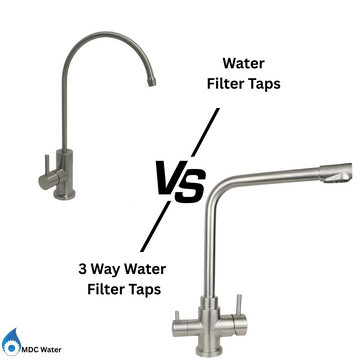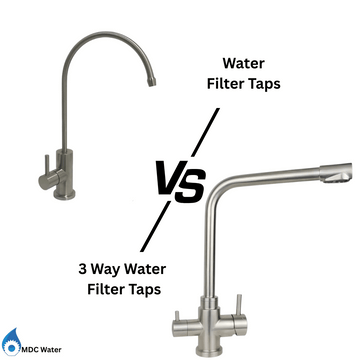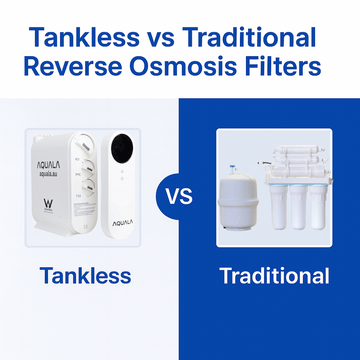Australians are investing more than ever in water filter taps. With health concerns like chlorine, PFAS “forever chemicals,” and microplastics making headlines, filtered water faucets have become a kitchen must-have. But here’s the catch: the tap itself matters just as much as the filter inside.
Most buyers focus on the filtration unit but overlook the faucet material. And that’s a big mistake. The choice between a cheap brass water filter tap and a premium stainless steel water filtration tap can affect your family’s health, the taste of your water, and the long-term value of your investment.
In this guide, we’ll compare brass vs stainless steel taps head-to-head so you can choose wisely.
Why the Material of Your Filtration Faucet Matters
A filtration faucet isn’t just a dispenser, it’s the final point of contact between your water and your glass. If the faucet leaches metals or corrodes, your “pure” filtered water could pick up contaminants before you even drink it.
-
Brass taps are an alloy of copper and zinc. To improve machinability, some contain traces of lead. Even small amounts can leach into drinking water, especially as the tap ages or corrodes.
-
Stainless steel taps are food grade, corrosion resistant, and completely lead free when certified. They’re designed to withstand Australian water conditions without altering taste or safety.
With Australia set to enforce stricter lead-free plumbing regulations in 2026, the choice is already clear: stainless steel is the future-proof option.
Cheap Brass Water Filter Taps
Let’s be fair brass filtered water faucets are common for a reason:
Pros:
-
✅ Lower upfront cost (often $30–$60).
-
✅ Widely available in most plumbing and hardware stores.
-
✅ Proven material for general plumbing (non-filtered applications).
Cons:
-
❌ Potential lead leaching (not fully lead-free unless specified).
-
❌ Corrosion risk over time, especially if the chrome plating wears off.
-
❌ Can impart a metallic taste to filtered water.
-
❌ Shorter lifespan compared to stainless steel.
-
❌ Typically lack WaterMark certification, which is mandatory for plumbing fittings in Australia.
For households looking for the cheapest possible option, brass taps can do the job. But they’re not ideal for long-term filtered drinking water use.
Stainless Steel Water Filtration Taps
Stainless steel filtered water faucets are the premium option, and for good reason.
Pros:
-
✅ 100% lead-free and compliant with upcoming 2026 standards.
-
✅ Corrosion and rust resistant, even with constant water contact.
-
✅ Long lifespan (10+ years with minimal wear).
-
✅ WaterMark certified, ensuring safety and insurance compliance.
-
✅ Sleek, modern design that complements Australian kitchens.
-
✅ Doesn’t affect taste, your filtered water stays as pure as it should be.
Cons:
-
❌ Higher upfront cost ($75–$120+).
-
❌ Slightly heavier than brass taps.
For health-conscious families, renovators, and homeowners who value style and durability, stainless steel taps are the clear winner.
Brass vs Stainless Steel Taps: Side-by-Side Comparison
| Feature | Cheap Brass Water Filter Tap | Stainless Steel Water Filtration Tap |
|---|---|---|
| Safety (Lead) | May contain traces of lead | 100% lead-free, compliant with 2026 standards |
| Durability | Coating may chip, corrosion risk | Rust- and corrosion-resistant |
| Taste Impact | Can impart metallic taste | Neutral, preserves clean water taste |
| Maintenance | Needs sanitising, prone to wear | Minimal maintenance required |
| Lifespan | 3–5 years average | 10+ years average |
| Warranty | Often 6–12 months | 1-2 years average |
| Design | Basic, chrome-plated | Modern, brushed or polished finishes |
| Certification | Often uncertified | WaterMark certified for Australian use |
Real-World Considerations for Australians
Choosing a tap water filter faucet isn’t just about specs. Here’s what Aussies should factor in:
-
Kitchen space & renovations: Around 45% of filtration faucet purchases happen during kitchen renovations. A stainless steel water filtration tap doubles as a style upgrade.
-
Renters vs homeowners: Renters may want a tap that’s easy to remove without damaging the sink. Stainless steel taps paired with 3-way mixer setups can avoid drilling new holes.
-
Regional water quality: Areas like NSW and ACT have raised PFAS concerns. Stainless steel taps combined with RO systems (like Aquala P500) ensure 99% removal while keeping water safe at the faucet.
-
Peace of mind: With brass taps, there’s always a lingering worry about corrosion or leaching. Stainless steel taps remove that concern entirely.
Spotlight: Stainless Steel Water Filtration Tap from MDC
At MDC Water, we’ve chosen stainless steel exclusively for our filtered water faucets, because your family’s health deserves better than “cheap brass.”
One standout option is our Stylish Stainless Steel Water Filter Tap
-
✅ Lead-free, food-grade stainless steel.
-
✅ Sleek, minimalist design that suits modern kitchens.
-
✅ WaterMark certified, meets Australian plumbing standards.
-
✅ Designed for long-term durability and consistent performance.
Paired with an under-sink filter or RO system, it’s the perfect finishing touch to a safe, stylish kitchen.
Buyer’s Checklist: Quick Guide
When choosing a filtered water faucet, run through this checklist:
-
Is it lead-free? (If not, skip it.)
-
Is it WaterMark certified? (Vital for compliance and insurance.)
-
What’s the material? (Brass = short-term, Stainless = long-term.)
-
How does it fit your budget? (Cheaper now vs. costlier later.)
-
Does the design match your kitchen style?
FAQ
Q: Are brass water filter taps safe in Australia?
A: Some are safe if lead-free certified, but many cheap imports aren’t. With the 2026 lead free plumbing code, stainless steel is the safer, future proof choice.
Q: Why choose a stainless steel filtration faucet over brass?
A: Stainless steel taps are healthier (lead-free), more durable, and won’t corrode or affect water taste. Brass taps may save money upfront but can compromise safety and lifespan.
Q: What is WaterMark certification and why does it matter?
A: WaterMark certification ensures taps meet Australian plumbing standards. Without it, plumbers may refuse installation and insurance may be void.
Q: Do stainless steel water filtration taps last longer?
A: Yes. Stainless steel taps often last 10+ years, compared to 3–5 for brass taps.
Conclusion: The Smarter Choice for Aussie Kitchens
In the debate of brass vs stainless steel water filter taps, the winner is clear. Brass taps might save you a few dollars upfront, but stainless steel taps protect your family’s health, last longer, and look better doing it.
Why compromise on the final step of your filtration system? Pair your under-sink filter with a stainless steel water filtration tap and enjoy pure, safe water every day.
👉 Browse our full range of stainless steel water filter taps or check out our Stylish Stainless Steel Tap here.
Because clean water deserves a tap that’s just as pure.




